The top ESD certification programs will advance your career in electronics manufacturing and testing. Start with ESDA's Program Manager Certification to master ESD control program development and auditing. The iNARTE ESD Engineer/Technician path offers globally recognized credentials for technical expertise. Consider Tonex's hands-on ESD Technician Program for practical skills, or explore ESDA Online Academy's specialized tracks. For protection design, pursue the Device Design Certification, while Device Stress Testing Certification enhances your testing capabilities. IPC's ESD Control program rounds out your fundamentals. These certifications provide the stepping stones to become an industry-leading ESD professional.
Why Choose ESD Certification

The decision to pursue ESD certification offers numerous compelling advantages for professionals and organizations in the electronics industry.
When you obtain ESD certification, you'll immediately enhance your operational efficiency by reducing costly incidents, minimizing rework requirements, and optimizing production timelines. Certification aligns you with the strict TL 9000 standard for telecommunications industry best practices.
Your organization's product quality will substantially improve as you implement standardized ESD control measures. You'll see increased yields, reduced waste, and stronger compliance with industry-specific safety requirements. This commitment to quality directly translates to higher customer satisfaction and confidence in your products.
You'll gain a distinct competitive edge in the market, as ESD certification demonstrates your dedication to industry best practices. It's a visible proof of your ESD controls that makes you a preferred choice for customers and partners, opening doors to valuable collaborations and broader market opportunities.
The certification guarantees you're fully compliant with safety standards while reducing the risk of costly ESD incidents. You'll acquire essential knowledge to implement effective control measures and foster a culture of quality throughout your organization.
This thorough approach to ESD management positions you as a leader in maintaining the highest standards of electronic product manufacturing and handling.
ESDA Program Manager Certification
Professional ESD managers seeking thorough training will find the ESDA Program Manager Certification program essential for mastering static discharge control. You'll gain extensive knowledge through ten specialized courses covering everything from ESD basics to advanced ionization concepts.
The program aligns with ANSI/ESD S20.20 standards and equips you with skills for designing, implementing, and auditing ESD control programs. You'll learn vital aspects of in-plant auditing, evaluation measurements, and effective air ionization techniques. Completing this certification can lead to higher median earnings compared to non-certified professionals in the field.
| Course Component | Key Focus | Benefits |
|---|---|---|
| ESD Basics | Static creation & protection | Foundation knowledge |
| Auditing & Evaluation | S20.20 compliance | Assessment skills |
| Ionization Issues | Air ionization effectiveness | Process optimization |
| Control Program | Handling & assembly | Implementation expertise |
| Technical Requirements | Program development | Standards compliance |
Upon completing the certification, you'll demonstrate proven competency in ESD program management. The certification's recognition by EOS/ESD Association and iNARTE enhances your career prospects, as many employers consider it a hiring requirement. You'll also gain access to a professional network for ongoing ESD-related problem-solving and discussions.
Inarte ESD Control Specialist Path
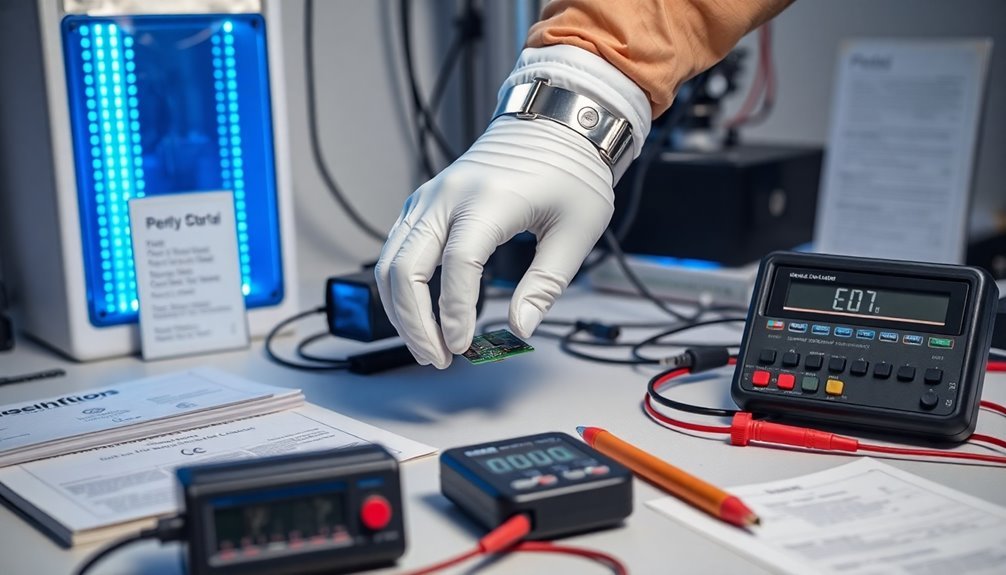
To earn your iNARTE ESD Control Specialist certification, you'll need to pass an online exam with a minimum score of 80% and demonstrate your commitment to continuing professional development.
Your technical assessment will thoroughly test your knowledge of ESD basics, control program development, and ANSI/ESD S20.20 standards. The four-hour exam format allows sufficient time to complete all 50 multiple-choice questions.
The certification opens up career advancement opportunities in ESD engineering roles across private and government sectors, with special application benefits available for military service members.
Certification Requirements And Process
Through rigorous standards and extensive requirements, iNARTE's ESD Control Specialist certification path offers two main certification levels: Engineer and Technician.
To qualify for the Engineer certification, you'll need to provide your college transcripts and demonstrate nine years of EMC-related work experience. For the Technician level, you'll need six years of relevant experience along with your educational documentation.
Both certification paths require you to obtain three professional references – one from your supervisor and two from peers. The examination lasts four hours total and allows open book materials. You'll need to pass a thorough examination with a minimum score of 70%, demonstrating your knowledge of ESD control programs, standards like ANSI/ESD S20.20, and industry best practices.
The certification process tests your understanding of ESD theory, physics, and control procedures. You'll need to show proficiency in compliance verification auditing techniques and demonstrate your ability to implement ESD control guidelines across various facilities.
The examination evaluates your knowledge of key industry standards and your capacity to apply them effectively in real-world situations. This certification validates your expertise in managing and controlling electrostatic discharge risks in professional environments.
Technical Assessment Components
Mastering the technical components of iNARTE's ESD Control Specialist certification demands an extensive understanding across multiple specialized areas. You'll need to demonstrate proficiency in ESD basics, including static electricity creation and damage prevention techniques.
The assessment evaluates your knowledge of in-plant auditing procedures and evaluation measurements that comply with S20.20 standards. The four-hour examination allows candidates to use reference materials and calculators during testing.
You'll face technical questions about air ionization in static charge management and ESD protective packaging principles. The assessment also tests your comprehension of system-level ESD/EMI testing according to IEC standards.
You must show expertise in electrostatic calculations, including Gauss' Law, capacitance, and charge sharing concepts.
The technical components include practical applications of device technology and failure analysis. You'll need to prove your understanding of high-speed digital oscilloscope fundamentals and testing essentials for both HBM and MM standards.
The assessment verifies your ability to develop and maintain Electrostatic Protected Areas through proper measurements and controls. Your knowledge of ESD Association documents and standards will be thoroughly evaluated, ensuring you can implement thorough ESD control programs in real-world scenarios.
Career Growth Opportunities
Building upon iNARTE's ESD Control Specialist certification opens diverse career advancement paths across multiple industries. You'll develop extensive expertise in ESD control measures, protection design, and program management while gaining recognition from both private companies and government agencies.
The certification enhances your professional credibility through intensive training in ESD basics, standards, and testing methodologies. You'll master practical applications that directly align with ANSI/ESD S20.20 standards, making you valuable to organizations requiring strict ESD control practices. Networking opportunities with industry professionals expand your professional connections significantly.
Key career benefits you'll gain include:
- Enhanced technical competency in identifying and mitigating ESD hazards
- Ability to develop and audit thorough ESD control programs
- Expertise in stress testing and protection design methodologies
- Recognition as a qualified professional across multiple industries
- Increased earning potential through specialized knowledge
The certification's thorough study materials, including guides and practice exams, prepare you for the iNARTE ESD Certification Exam.
This professional development path guarantees you're equipped with both theoretical knowledge and practical skills, positioning you for roles in quality control, manufacturing, electronics, and other ESD-sensitive environments.
Tonex ESD Technician Program
Professionals seeking thorough ESD training can find exceptional value in the Tonex ESD Technician Program, a two-day certification course that combines hands-on experience with essential theoretical knowledge.
You'll learn extensive ESD fundamentals through five focused modules, starting with basic concepts and progressing to advanced troubleshooting techniques. The program covers critical areas including ESD standards, control program design, measurement techniques, and problem-solving strategies.
You'll gain practical experience using ESD control tools while mastering industry best practices and compliance requirements. Geographic training locations are available across multiple countries and territories to accommodate diverse learning needs.
What makes this program particularly effective is that you don't need prior experience – it's designed to accommodate both beginners and seasoned professionals in electronics manufacturing and handling. Throughout the course, you'll develop skills in risk assessment, control measure implementation, and root cause analysis.
The program's structure guarantees you'll understand not just the 'what' but also the 'why' of ESD protection.
Upon completion, you'll receive certification as an ESD Technician, positioning you to implement effective ESD control measures in various work environments. This certification demonstrates your competence in protecting sensitive electronic components and managing ESD-related risks in professional settings.
ESDA Online Academy Courses
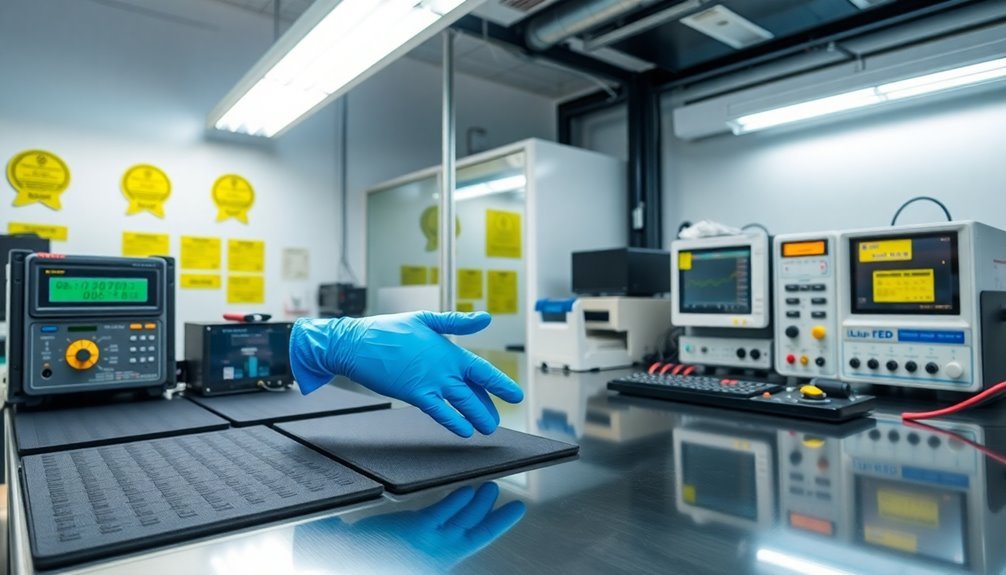
The ESDA Online Academy delivers numerous specialized certification tracks through four main disciplines: Factory Control, Device Design, Device Stress Testing, and General Practitioner. You'll find extensive courses ranging from basic to advanced levels, with pricing at $195 per credit or $1,755 for a bundle of 10 credits. Annual renewal fees of $100 help maintain your active certification status.
The academy offers several certification pathways designed to build your expertise in specific areas:
- Program Manager (PrM) track includes FC100, FC340, and FC210 courses focusing on ESD basics and program development
- Device Design (DD) certification covers ESD circuits, protection design, and qualification testing
- Device Stress Testing (DT) pathway encompasses failure analysis and work area control
- ESD Design Engineer Certificate (EDEC) combines various design and testing courses
- General Practitioner courses address system-level ESD and ultra-sensitivity trends
You'll access your training through live online classes or on-demand courses, allowing flexibility in your learning schedule.
The curriculum follows structured pathways including foundations, methods, assessment, explanatory, and special topics. Whether you're developing ESD control programs or implementing design solutions, you'll find courses tailored to industry-specific skill sets and compliance requirements.
Device Design Certification Options
Among specialized ESD certifications, device design programs stand out as highly targeted pathways for engineers and technicians. The ESDA EDEC certification emerges as an extensive option, featuring eight online courses and a knowledge assessment test that covers integrated circuit ESD, protection designs, and testing essentials. You'll need to recertify annually to maintain your credentials.
If you're looking for alternatives, the iNARTE Electrostatic Discharge Control certification offers a different focus, concentrating on ESD control rather than device design. While it's valuable for engineering professionals, it doesn't specifically address device design elements like the EDEC program does.
With the semiconductor industry's projected 8.6% CAGR through 2028, you'll find these certifications increasingly valuable. Companies like Mitsubishi Electric rely on electrical discharge manufacturing for precision work, making skilled ESD engineers essential.
You can choose between EDEC's device design focus or iNARTE's control-oriented program based on your career goals. While LearnEMC offers EMC compliance courses, they don't cover ESD device design specifically. These certification options complement each other, providing you with distinct paths for professional development in the ESD field.
Device Stress Testing Programs

Through thorough training modules, the Device Stress Testing Certification equips you with essential skills for ESD and Latch-Up testing procedures. You'll gain extensive knowledge of current ESD standards and testing methodologies through ten one-hour online courses, including eight required modules and two electives of your choice.
The certification program offers significant professional advantages while guaranteeing you're up-to-date with industry standards like IEC 62368-1 and ISO 10605.
You'll need to maintain your certification with continuing education and a $100 annual renewal fee.
Key benefits you'll receive include:
- Digital badge credentials through Credly to enhance your professional profile
- Improved first-time-right testing capabilities that reduce overall costs
- Enhanced lab credibility for ESD and Latch-Up stress testing
- Access to thorough courses covering fundamentals and advanced topics
- Ongoing education to stay current with evolving standards
To maintain your certification, you'll complete a standards update refresher course every two years and a tutorial on alternating years. This structure guarantees you're always equipped with the latest knowledge in ESD testing methodologies and industry requirements.
ESD Career Growth Opportunities
Building a successful career in ESD control starts with fundamental education and evolves through specialized certifications and continuous professional development. You'll need a high school diploma with strong foundations in physics and mathematics, followed by an associate degree in electronics or related fields.
| Career Level | Requirements | Growth Path | Opportunities |
|---|---|---|---|
| Entry Level | High School Diploma, Associate Degree | Basic ESD Certifications | Technician Roles |
| Mid-Level | iNARTE Certification, ANSI/ESD Training | Specialized Training | Supervisor Positions |
| Advanced | EOS/ESD PrM, DD, DT Certifications | Industry Expertise | Consultant Roles |
| Expert | Continuous Education, Research | Technology Leadership | Global Opportunities |
To advance your career, you'll want to pursue professional certifications through the EOS/ESD Association, including Program Manager, Device Design, and Device Stress Testing programs. These certifications are globally recognized and can open doors to international opportunities. You can enhance your expertise through online training courses and stay current with emerging trends in nanotechnology and AI. The field offers various specialization paths, from ESD training to consultancy, with growing demand in electronics and electrical engineering industries.
Frequently Asked Questions
How Long Does It Typically Take to Complete an ESD Certification?
You'll find ESD certification duration varies widely. You can complete basic programs in one day, while others might take several months. Most common certifications require three online classes plus an assessment test.
Can ESD Certifications Be Transferred Between Different Countries or Regions?
Yes, you can transfer your ESD certifications between countries, but you'll need to meet local requirements. ANSI/ESD S20.20 and IEC 61340-5-1 certifications are globally recognized, though additional audits may be necessary.
Are There Any Age Restrictions for Pursuing ESD Certification Programs?
You won't face any specific age restrictions for ESD certification programs. However, you'll need to meet educational requirements like an Associate's degree and have at least two years of relevant work experience.
What Happens if You Fail the Certification Exam Multiple Times?
If you fail multiple times, you'll typically face waiting periods between attempts, pay additional fees, and may need extra training. Some programs might limit your attempts or require remedial coursework before retesting.
Do ESD Certifications Need to Be Periodically Renewed After Completion?
Yes, you'll need to periodically renew your ESD certification through retraining and testing. Most facilities require renewal every 12 months to guarantee you're up-to-date with current standards and safety procedures.
In Summary
You've got multiple paths to advance your ESD career through these certification programs. Whether you're pursuing ESDA certification, specialized device testing, or technical training, you'll gain essential skills employers value. Don't wait to boost your credentials – the ESD field continues growing, and certified professionals command higher salaries. Take the next step by choosing the program that best fits your career goals and schedule.

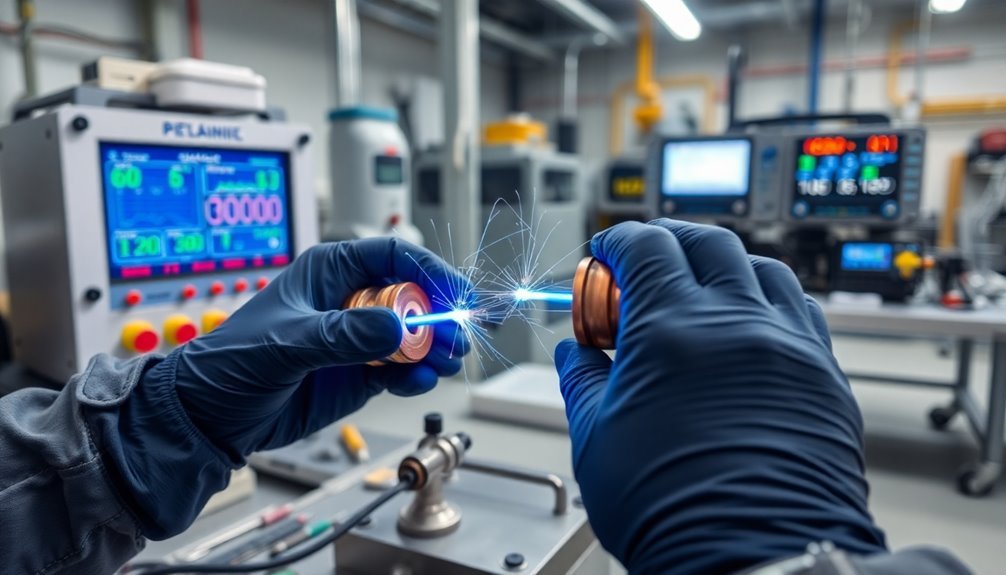
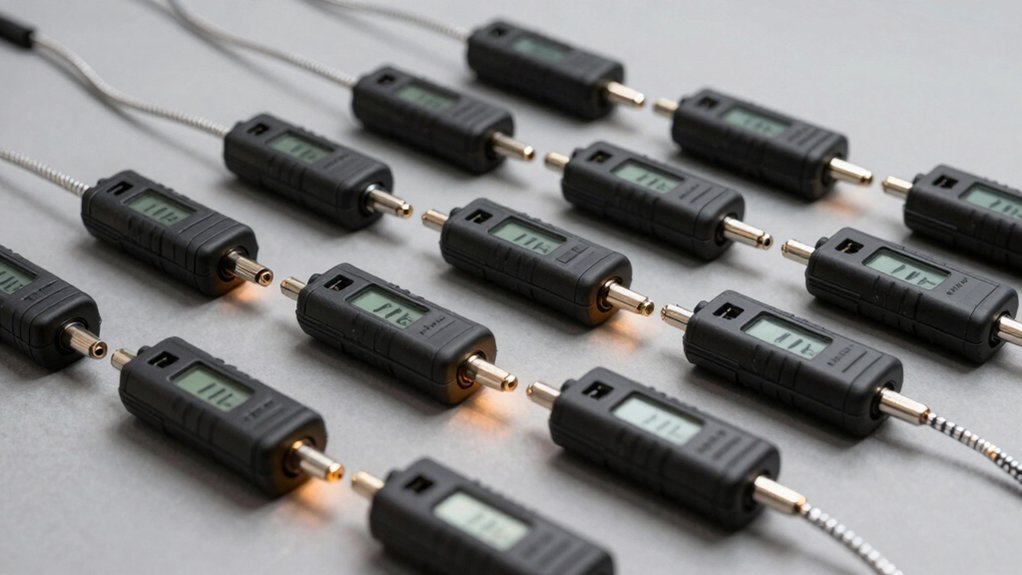

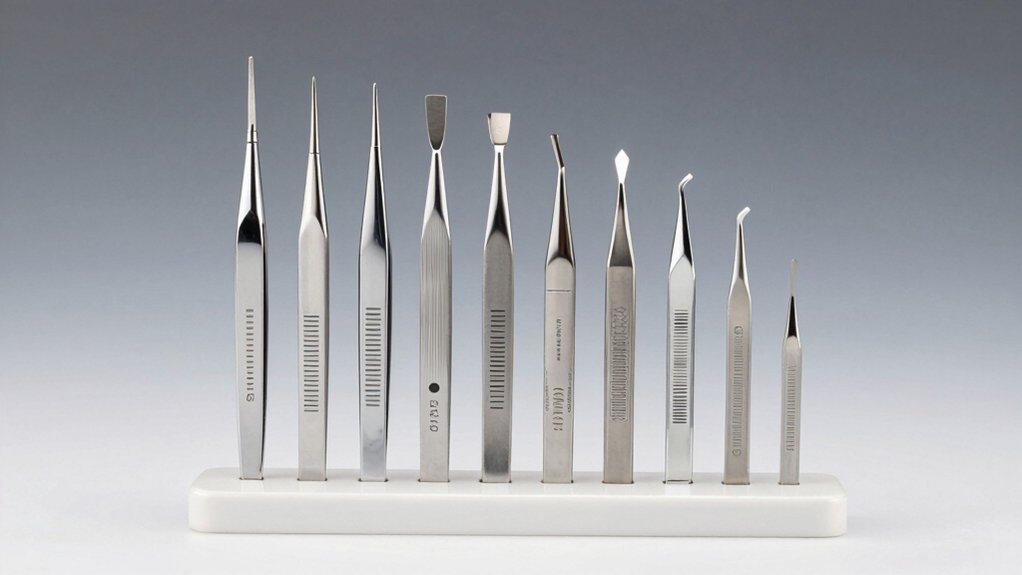
Leave a Reply